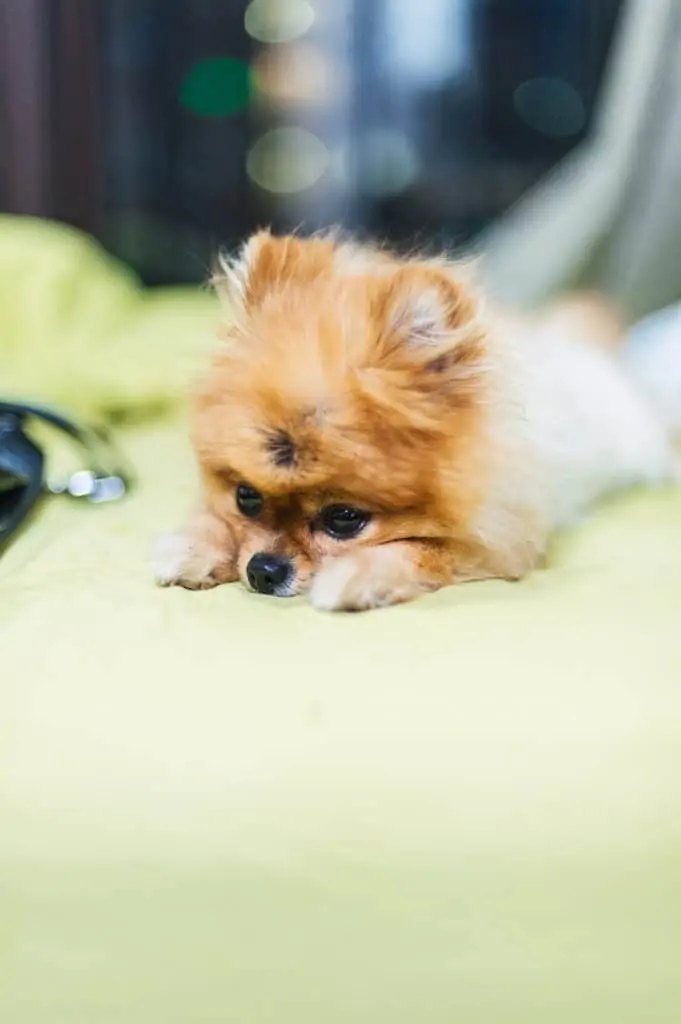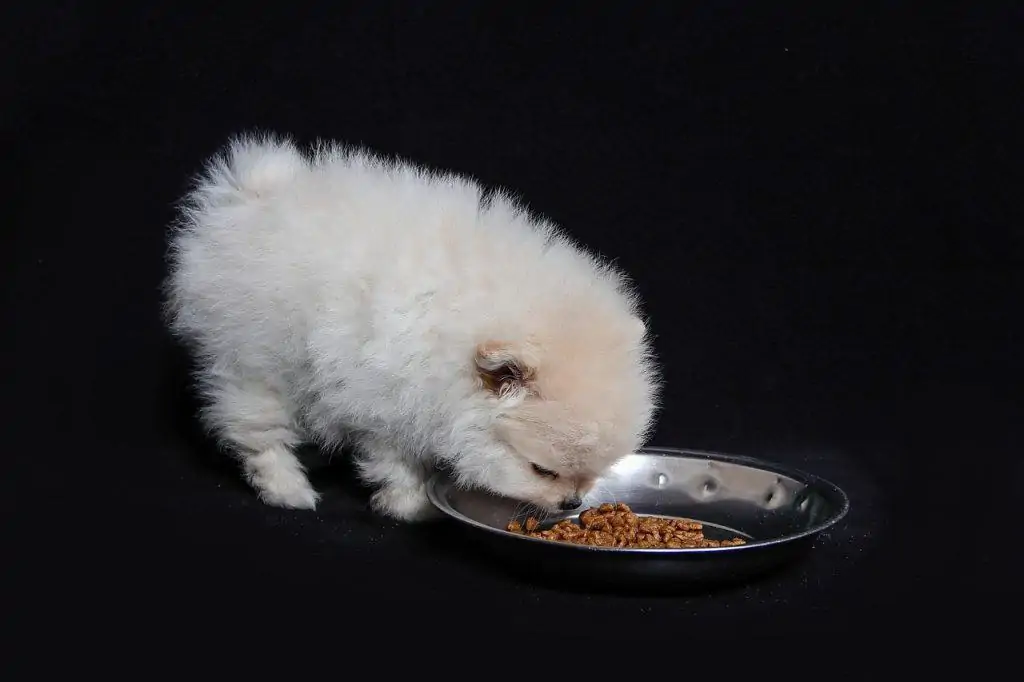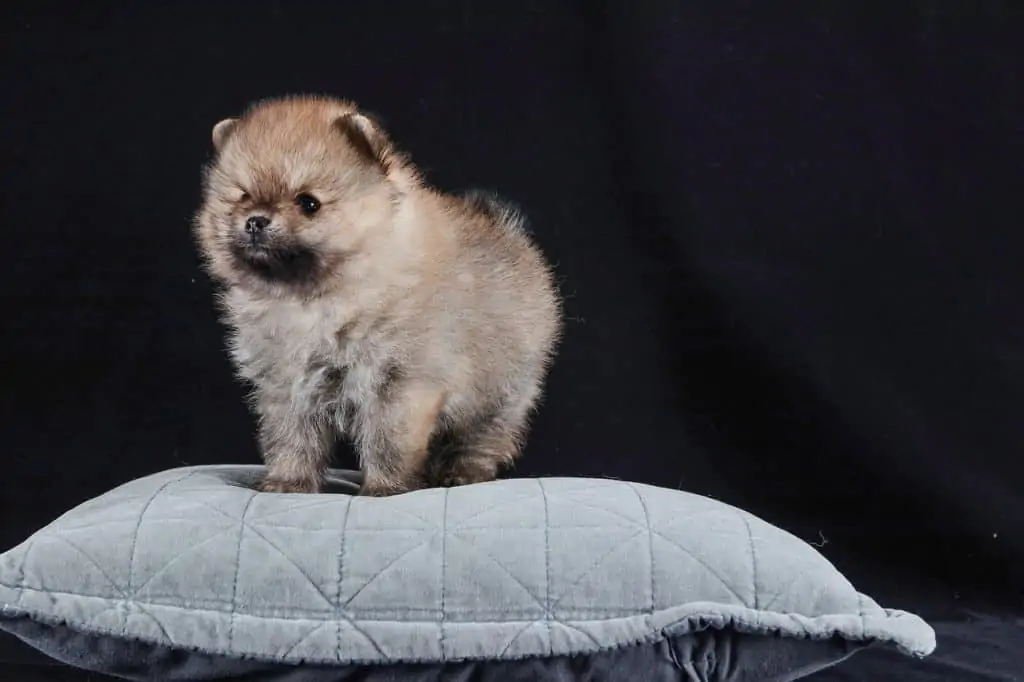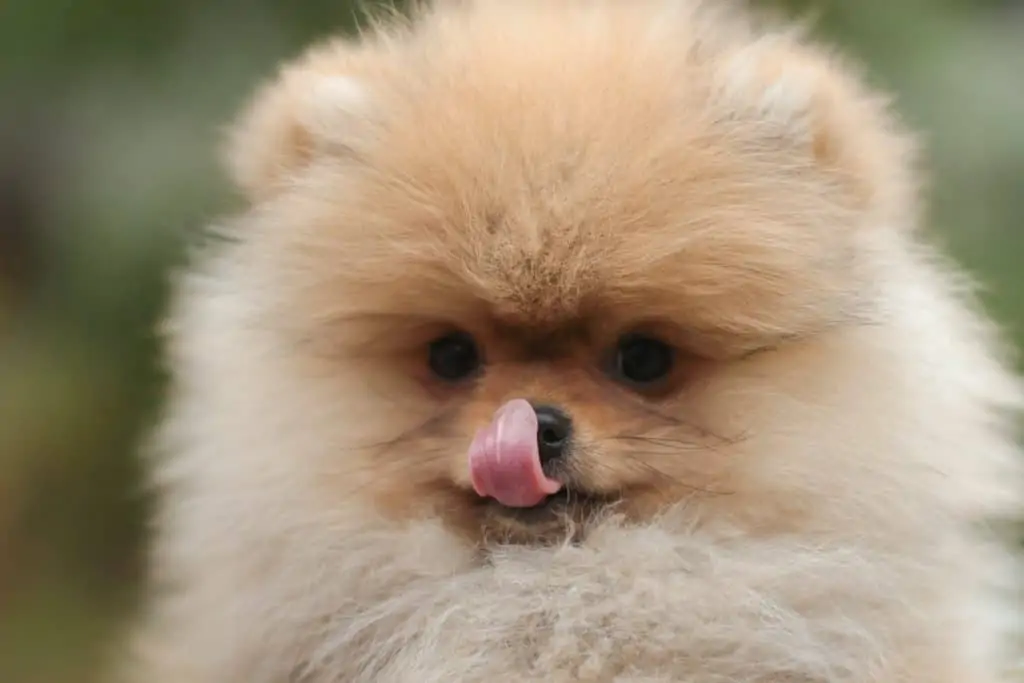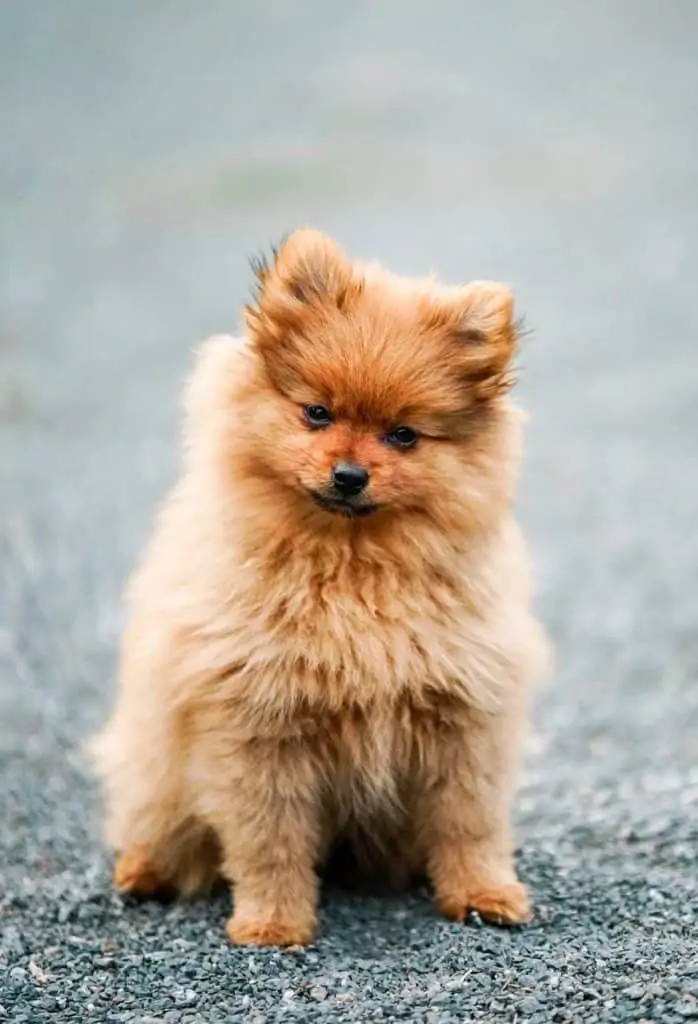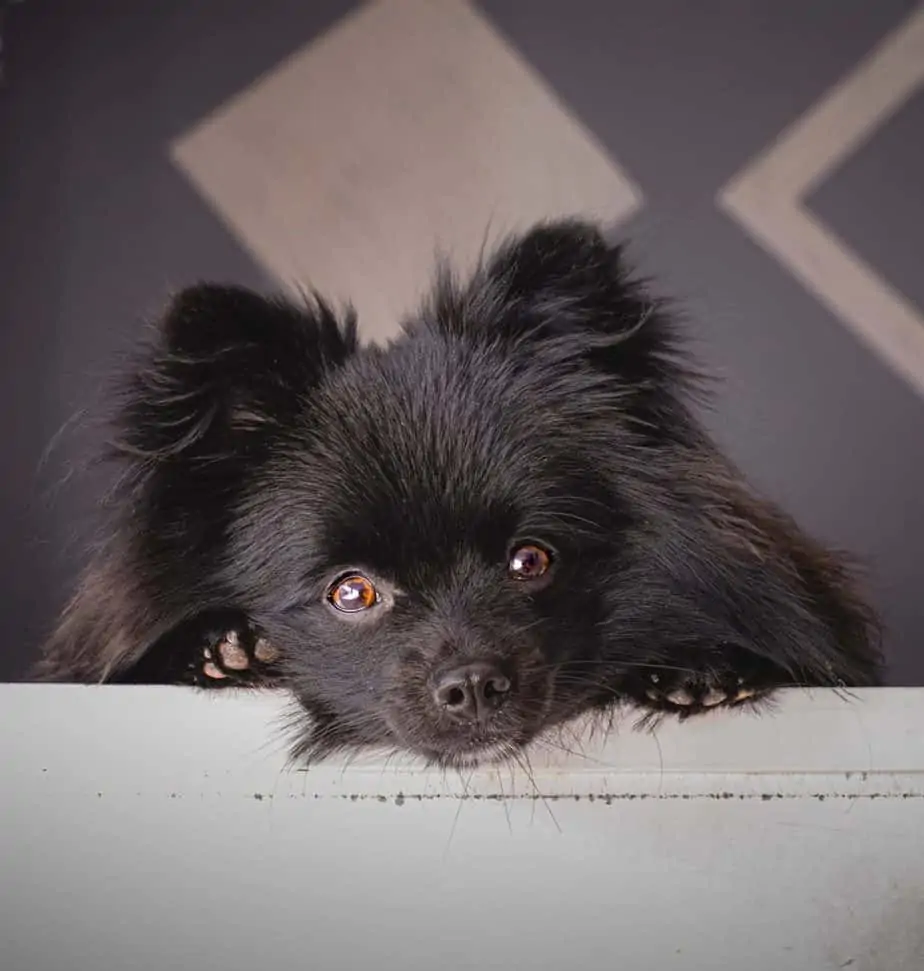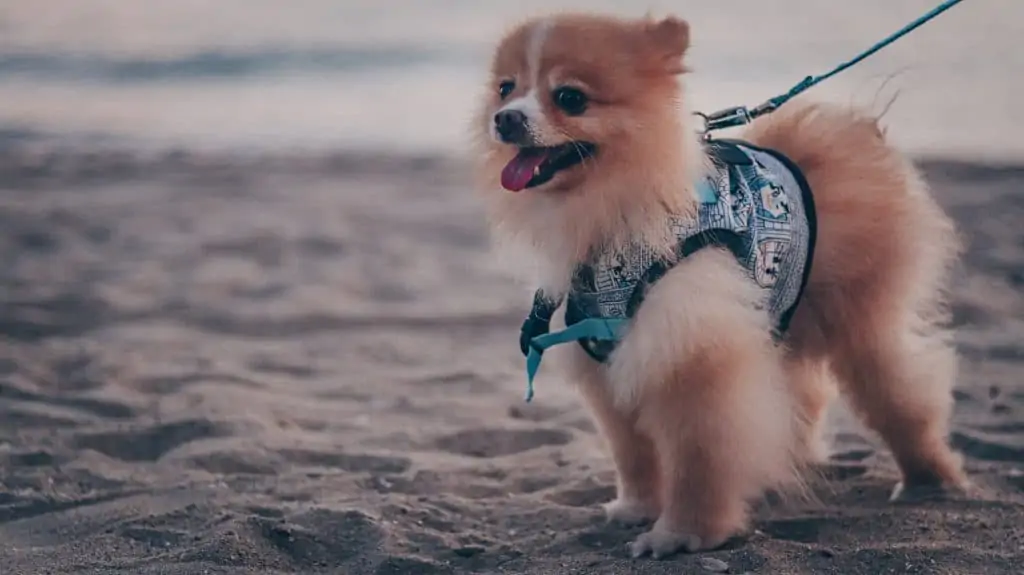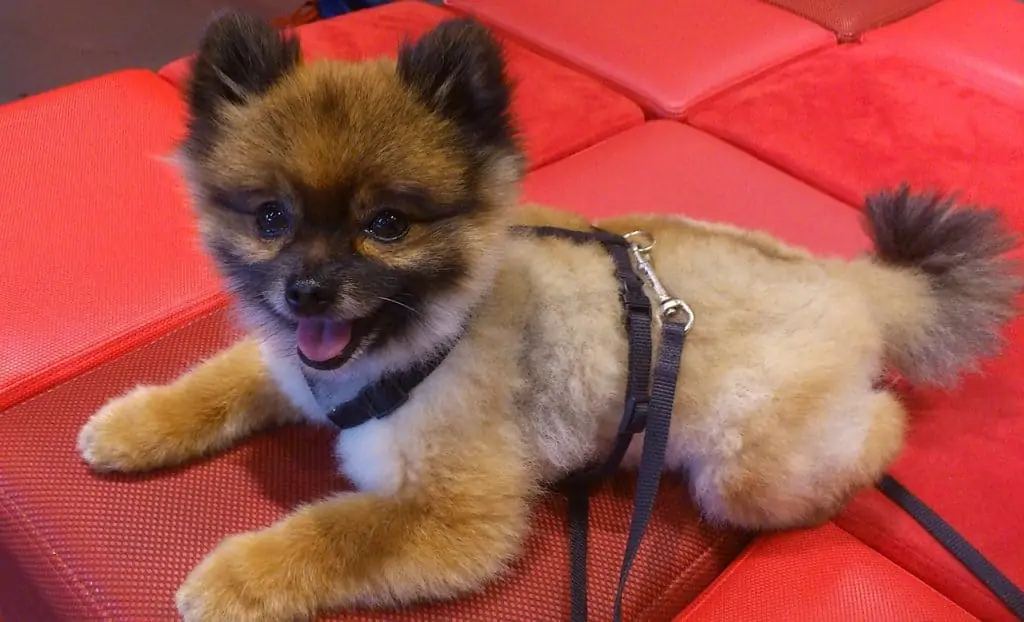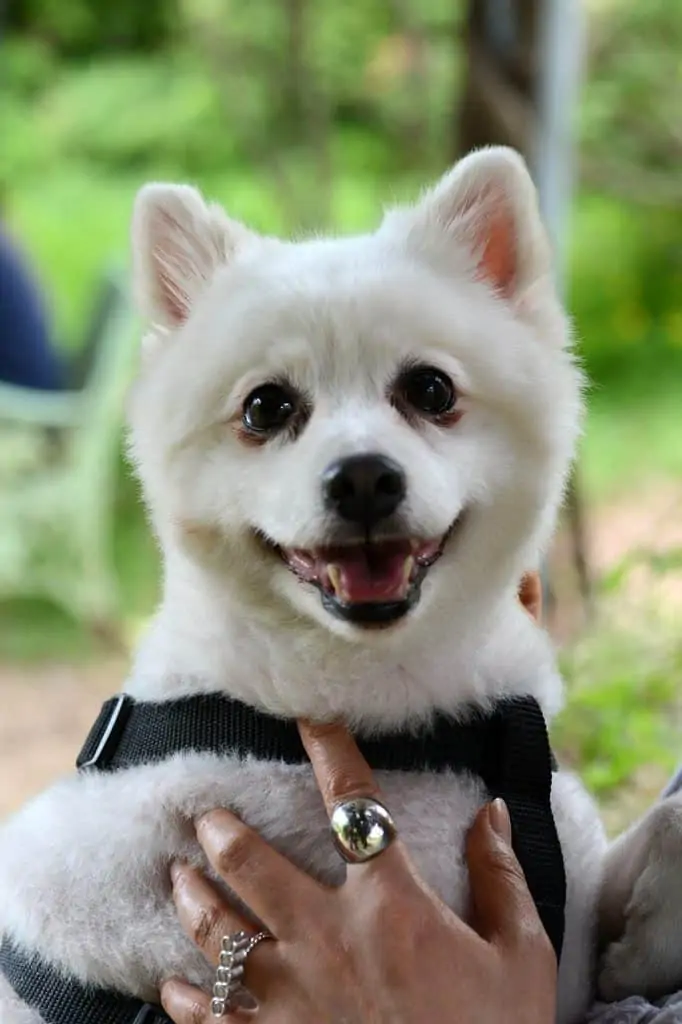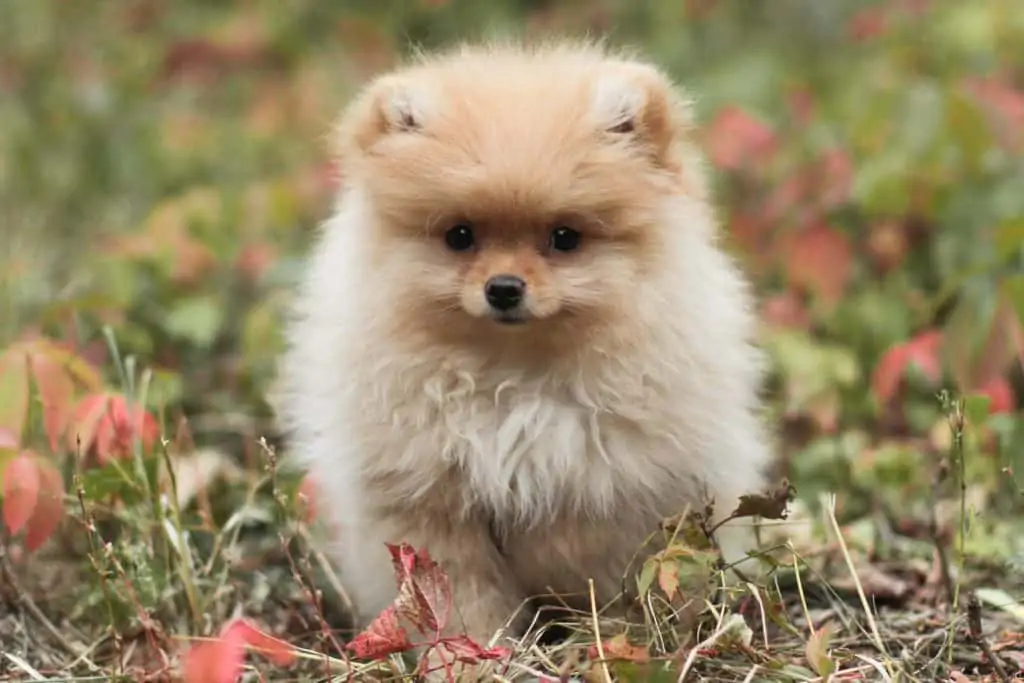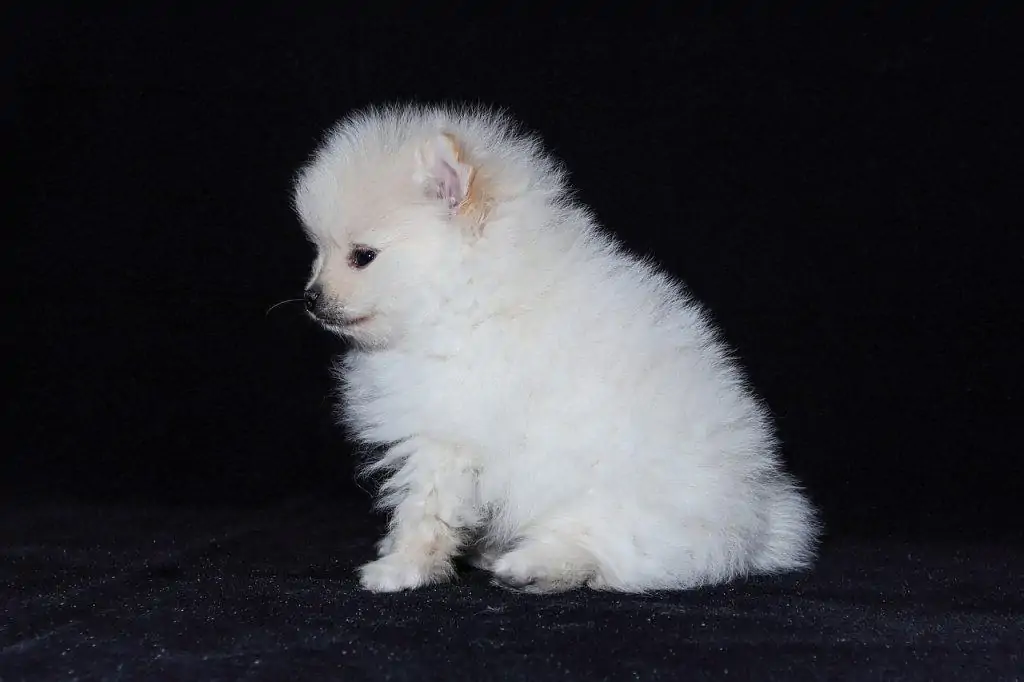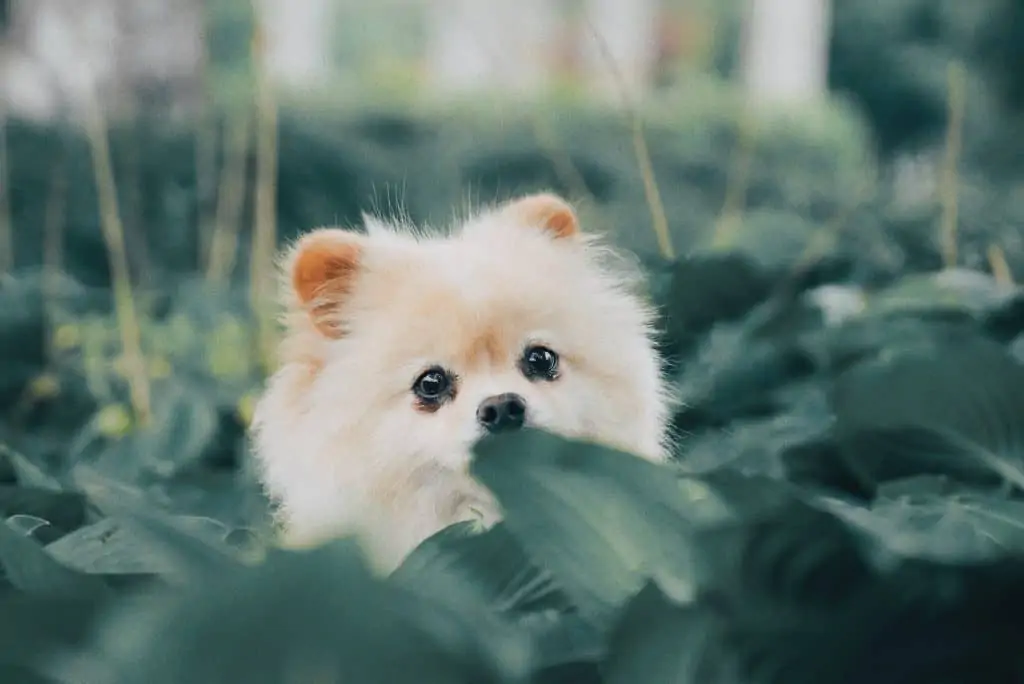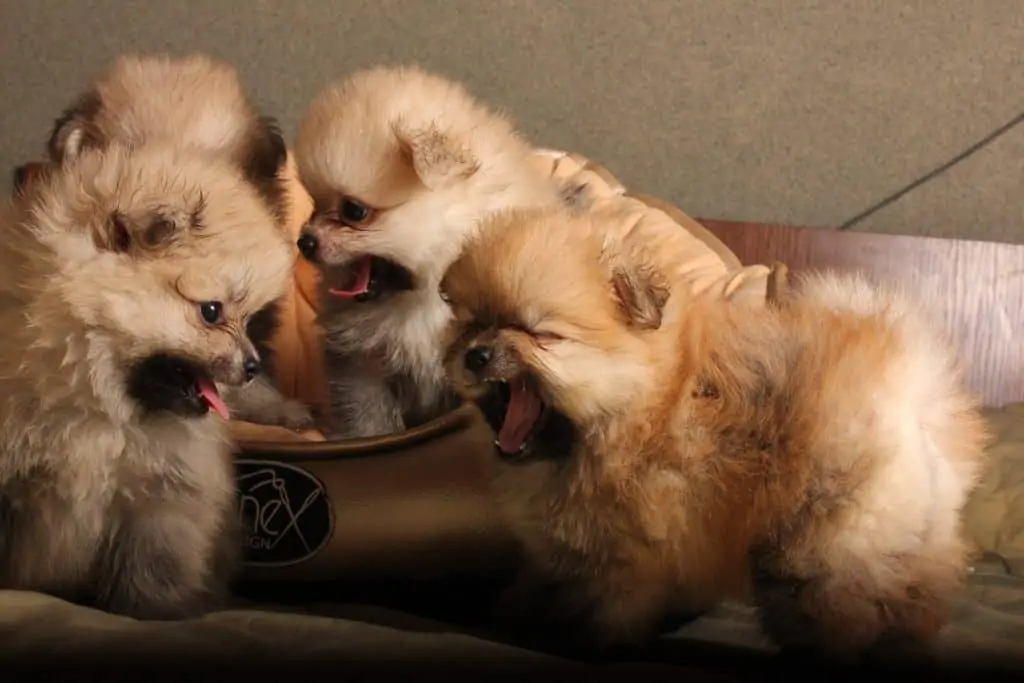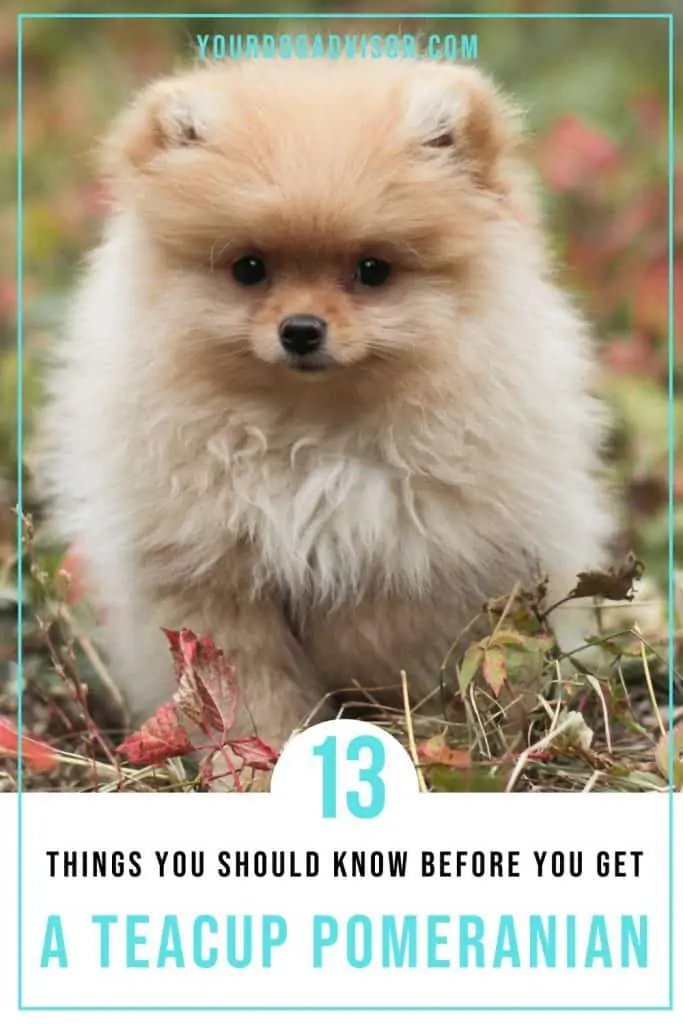Pomeranians are famous for their teddy bear-like appearance, sweet disposition and teensy size. But did you know it’s possible to get a Pomeranian that’s even smaller than usual?
That’s right – we’re referring to the Teacup Pomeranian. But just because you can get a Teacup Pomeranian doesn’t mean you should.
So, before you decide if this tiny breed is right for you, here are 13 things you should know.
Contents
The Teacup Pomeranian At A Glance
The Teacup Pomeranian is any Pomeranian that weighs under 3 pounds.
The Teacup Pomeranian is, not surprisingly, a smaller version of the already small Pomeranian dog. On average, Pomeranians are around 6 to 7 inches tall and weigh between 3 and 7 pounds.
A Teacup Pomeranian is a Pomeranian that is smaller than this average height and weight.
Teacup Pomeranian Height: Under 6 inches
Teacup Pomeranian Weight: Under 3 Pounds
Coat Type: Double-coated, shedding
Coat Color: Black, white, brown, orange, tan, grey, grey-shaded
Life Span: 12 – 16 Years
Temperament: Affectionate, Curious, Spirited
Energy Level: Moderate
Exercise Needs: Moderate
Common Health Conditions: Obesity, dental disease, hypoglycemia, Severe Hair Loss Syndrome, luxating patella, cataracts, and tracheal collapse
1. There Are Actually No Size Variations Of Pomeranian
Teacup Pomeranians aren’t really teacup sized. They are just smaller than usual.
When it comes to dog breeds, we are accustomed to hear terms like teacup, toy, miniature and standard. While some breeds do have specific size variations, like the Poodle, for example, the Pomeranian does not.
This means that the Teacup Pomeranian is not actually a size variation of Pomeranian and is instead a Pomeranian dog that is smaller than the average size. In other words, the Teacup Pomeranian is a Pomeranian under three pounds.
While the Teacup Pomeranian is considered a purebred and is actually just a small Pomeranian, his size is often grounds for disqualification when it comes to show. This means that anyone hoping to compete with a Pomeranian should avoid purposefully getting one smaller than three pounds.
And speaking of purposefully buying a Pomeranian under three pounds, let’s talk about the importance of responsible breeding practices.
2. Be Careful of Breeders Purposefully Breeding Teacup Pomeranians
Most reputable breeders will not intentionally breed teacup size Pomeranians, as this could put these dogs at risk for serious health issues.
As we mentioned above, most Pomeranians range in size from three to seven pounds. That said, some Pomeranians can naturally be larger while some can naturally be smaller.
While Teacup Pomeranian puppies can be born in otherwise healthy litters and sold by breeders who have been sure to practice responsible breeding practices, most experts recommend that you avoid breeders who promote the breeding and selling of these smaller dogs on purpose.
Purposefully breeding Teacup Pomeranians means that breeders had to specifically breed smaller than average Pomeranian dogs in order to achieve this smaller size in their litter. Unfortunately, smaller sized Pomeranians are more at risk for serious health issues than their average sized counterparts, and breeding two small, at risk Poms can raise the chances of their litter being unhealthy.
Furthermore, breeders who do promote the breeding and selling of Teacup Pomeranian dogs may also sell them at a much higher price than average size Pomeranians. As we will discuss further down, spending a lot of money upfront for a Teacup Pomeranian will not save you from spending money down the road when it comes to health complications related to size.
Even if you go through a reputable breeder, you are taking a risk when obtaining a Teacup Pomeranian.
That’s not to say that Teacup Pomeranians are not worthy of being adopted and adored. Remember, these little pups are sometimes naturally born in otherwise very average litters with average sized littermates.
It’s just important that potential owners are aware of the health risks and that they know it is better to look for a healthy puppy overall than a puppy who is smaller than average.
3. Because They Are So Small, Teacup Pomeranians Are At Higher Risk of Serious Health Problems
Smaller Pomeranian dogs are at higher risk for serious health issues like collapsed trachea and patella luxation.
We did touch briefly on the health complications of Teacup Pomeranians, and now it’s time to talk more specifically about what these health complications may entail.
While all dogs can be prone to serious health issues, dogs who are bred to be smaller than they should are at higher risk, especially toy dogs like Pomeranians.
A Teacup Pomeranian, or a Pomeranian under three pounds, is at an elevated risk of the below health issues:
- Collapsed Trachea
- Patella Luxation
- Hypoglycemia
- And Risk of Accidental Injury
Other health issues the Teacup Pomeranian could face based on his breed standard include:
- Dental Disease
- Overcrowding Teeth
- Heart Issues
- Obesity
- Cataracts
- And Severe Hair Loss Syndrome (SHLS)
Regardless of your Pomeranian’s size, it’s always a good idea to have them health screened at an early age. Most reputable breeders will have done this for you and will be able to provide you with a certificate of health proving their puppies are clear of any serious medical issues.
Otherwise, you can opt to have your Teacup Pomeranian screened yourself through your veterinarian. According to the National Breed Club, the Pomeranian breed should undergo:
- A Cardiac Exam
- A Patella Evaluation
- And an Ophthalmologist Evaluation
Other ways to ensure your Teacup Pomeranian is as healthy as possible is to ensure he eats a quality diet specified for his age, weight and activity level.
Smaller dogs in general require a high-calorie dog food that can keep up with their naturally faster metabolism.
Pomeranians will also need a dog food that contains real animal proteins, carbs, fatty acids, vitamins and minerals and is a good source of water.
Wellness Core Natural Small Dog Food
[amazon box=”B008J7G1QI” style=”light” title=”Wellness Dry Dog Food” template=”widget” ]
The Pomeranian is more susceptible to dental disease and tooth decay, which is why we recommend investing in a high quality dry dog food for small dog breeds. Dry dog food can help promote dental health and reduce buildup of tartar and plaque.
This dog food by Wellness Core is also made with all natural ingredients and is designed for small breed dogs who are active. You can order it in a grain free option or order it with grains, depending on your vet’s recommendation or research.
4. Teacup Pomeranians Are The Smallest of the Spitz Group
Pomeranians are spitz breeds, similar to Huskies and Malamutes.
Spitz dogs, identified by their double coats, thick fur, pointed ears and curled tails, are some of the most popular in the world. Most Spitz breeds are believed to have originated from working dogs in Siberia, like Siberian Huskies.
When we think of Spitz breeds, many of us think of large, muscular working dogs built to pull heavy loads through icy tundra. However, the tiny Pomeranian surprisingly belongs to this group and is a likely descendant of the German Spitz and dogs hailing from Lapland and Iceland.
Bred down in size to be a more compact lap companion, the modern-day Pomeranian still maintains many characteristics that makes the Spitz group so historically popular. Of course, he is just much, much smaller.
5. Like All Pomeranians, Teacup Pomeranians Are Very Sweet Natured, Though They Can Be Fearful of Strangers
Pomeranians, by nature, are sweet and affectionate lap dogs.
And speaking of a Spitz dog’s love for people, the Teacup Pomeranian is as affectionate as they come. This sweet natured and family oriented dog is the ideal pet for anyone looking for a constant companion.
However, it’s also important to be aware that Teacup Pomeranian dogs may grow up to be suspicious and even fearful of strangers. They may also be standoffish with other, larger pets. Due to their extraordinarily small size, it’s understandable why Teacup Pomeranins might be cautious.
They are prone to serious injury if handled or played with too roughly, so large animals and strange people may seem very intimidating to them.
While most Teacup Pomeranian dogs are not known to be aggressive, owners should be vigilant for fear-based behaviours that could turn to fear-based aggression and bites.
We should also note that, when it comes to small dogs especially, aggression is not always taken seriously.
Dogs who are fearful and turn to aggression to communicate this fear are typically highly stressed, and it’s vital to work with them to alleviate stress and reduce fear based behaviors so they can live a happier, healthier life.
Proper socialization beginning at an early age can help reduce fear and stressed behaviors, as can working with the people around you who are introduced to your dog to help them make first impressions safe and positive.
6. Teacup Pomeranians Make Great Family Dogs, But They Are Not Ideal For Small Children
Due to their very small size, Teacup Pomeranians could be more susceptible to serious injury if handled too roughly.
Like all especially small dogs, the Teacup Pomeranian can be prone to serious injury if handled too roughly. While these dogs are affectionate and adoring of their family members, they may not make the ideal companions for young children.
A drop or too rough of play can lead to broken bones, collapsed trachea, and other devastating injuries to your dog.
If you do have young children and a very small dog like a Teacup Pomeranian, it’s best to supervise them when they are together. Teach responsible children how to properly pick up the Pomeranian and how to handle him safely.
We also suggest working with children and even other family members on canine body language and facial expressions so they know how to accurately read the family dog.
Remember, though small, the Teacup Pomeranian will not like being handled or treated like a toy, especially by rough children. This could result in a nip or bite that, while not particularly dangerous, can still be painful and frightening for both the child and the dog.
7. Though Very Tiny, Teacup Pomeranians Still Need Routine Exercise
As Spitz dogs, Teacup Pomeranians are active and playful. They require routine exercise every day.
Because the Teacup Pomeranian belongs to the Spitz group, it may come as no surprise that this breed is active and energetic. However, if you didn’t realize a Teacup Pomeranian was part of the Spitz family, you may be taken aback to learn how active this little pup is.
Unlike many other small breeds, the Teacup Pomeranian requires routine daily exercise, playtime and walks each and every day in order to stay happy and healthy. They are more energetic than some and enjoy good walks through the neighborhood, free play in a yard or at a dog park with other small dogs, and games of fetch or tug of war in the house.
Teacup Pomeranians are also very intelligent. They come from work oriented breeds who like to stay busy and active, so it’s a good idea to offer your Teacup Pomeranian toys that keep him engaged and challenged.
Puzzle toys and interactive toys that utilize treats and present a challenge will ensure your Teacup Pomeranian is never bored, as will teaching him fun new tricks and cues throughout his life.
And because exercise and mental stimulation play such a vital role in your Teacup Pomeranians overall health and happiness, we have listed some of our favorite walking products and puzzle toys you might consider below.
Take a look.
Voyager Step-In Harness
[amazon box=”B00M0V7RWQ” style=”light” title=”Small Dog Harness” template=”widget” ]
A dog harness is a must-have for anyone with a dog, but especially for a very small dog like the Teacup Pomeranian. Remember, the Teacup Pomeranian is quite fragile and can suffer from broken bones and collapsed trachea, especially if pressure is put on his throat or neck during walks.
The above harness prevents pulling and choking during walks and is made of soft mesh. It is safer for small dogs to wear than collars alone during walks and reduces injury while increasing comfort.
The harness is also available in several sizes including XXXS, which can be difficult to come by when dealing with especially small dogs.
CALHNNA Pet IQ Puzzle Toy
[amazon box=”B07XDNWFXM” style=”light” title=”Puzzle Toy” template=”widget” ]
The above puzzle and interactive toy by CALHNNA is designed for smaller dogs who are beginners with puzzle toys. It is not too challenging to figure out but is still just challenging enough to keep your Pomeranian interested for a good period of time.
The tiny cups can be filled with kibbles or different treats, and your Teacup Pomeranian must use his nose and brain to find the treasures inside. This toy is made of dog-safe material and is small enough for easy storage.
We find that puzzle toys like these are most effective at keeping your dog engaged when they are only introduced during certain times, like when the family is leaving or the dog will be alone for longer periods of time throughout the day.
8. Grooming Requires Maintenance When It Comes to A Teacup Pomeranian
This Teacup Pom has a teddy bear haircut, which requires less maintenance from owners.
Teacup Pomeranians are a little more high-maintenance than you might expect for such a small dog when it comes to grooming.
Like Huskies, German Shepherds and Labrador Retrievers, Teacup Pomeranians have a double coat that sheds year-round. This means they require routine brushing and trims to keep their coat and skin healthy.
They shed more heavily during the shedding season in spring and fall and during this time they may need to be brushed and cared for every day.
A trip to the groomers is often needed on a routine basis for the Teacup Pom, especially if you choose to let his hair grow long.
Many owners opt to cut their Pomeranian’s coat short, like in the image above. Known as the teddy bear haircut, this cut can help alleviate heavy shedding and reduce the maintenance needed when it comes to brushing and care.
That said, we still advise against shaving a double-coated dog’s fur. Dogs with a double coat, like the Teacup Pomeranian may be more susceptible to heatstroke, sunburn, hypothermia and skin issues if their coats are shaved down.
Along with trims, cuts and routine brushing, it’s also important to make sure you are taking care of your Pomeranian’s teeth. Brushing once a day with a dog-safe toothbrush and toothpaste can help reduce the chances of your dog suffering from dental disease down the road.
Your teacup Pomeranian will also need his ears checked and cleaned often to keep them free of waxy buildup, moisture and debris, and his nails should be trimmed often to stop them from cracking or splitting.
The Teacup Pomeranian does need occasional bathing once every few weeks, but try not to overbathe your Pom. Doing so could disrupt his natural PH balance and lead to dry skin and other issues.
We also suggest investing in the right products to help keep your Pom looking his best, and we have a few of our favorites listed below for you to consider.
Pat Your Pet Deshedding Comb
[amazon box=”B01EZ7UOCM” style=”light” title=”Pat Your Pet Deshedding Comb” template=”widget” ]
Pomeranian dogs shed year-round and most heavily during shedding season, as we mentioned above. With that in mind, it will be important to invest in a quality deshedding comb that is able to get into their undercoat while also removing mats and tangles.
The above deshedding comb is a two-in-one dematting and undercoat rake for small dogs like the Pomeranian. It helps reduce loose fur and is safe enough and gentle enough to be used daily if needed.
PetPost Dental Wipes
[amazon box=”B07PMTJXKF” style=”light” title=”PetPost Dental Wipes” template=”widget” ]
Like many smaller dogs, the Teacup Pomeranian is highly susceptible to dental disease. Along with routine brushing and ensuring your dog gets into a canine dentist for cleanings, it’s a good idea to have dental wipes on hand.
Dental wipes are ideally used after meals and help not only reduce bad breath in your Teacup Pomeranian, but can also help reduce tartar and plaque build-up. The dental wipes are safe and easy to use, and are made without the use of harsh chemicals or ingredients that can be harmful to your dog.
The pre-soaked cotton is also very soft and gentle on your Pomeranian’s gums, and the wipes are flavored so your Pom won’t mind having his teeth wiped down.
9. Teacup Pomeranian Puppies May Not Stay Teacup-Sized
Some very small Pomeranian puppies surprise their owners by growing to be over 10 pounds.
Pomeranians are notoriously born small, often only weighing a few ounces at most. Even if a Pomeranian puppy is the smallest of his litter mates, that doesn’t mean he’ll stay that way. These pups are fast growing and steadily put on weight every day for his first few nine months.
Since most puppies are bought and sold within the first seven or eight weeks of their lives, this means you could have bought a tiny puppy you think is a teacup and actually wind up with one of the larger variations of Pomeranian.
Here’s the thing – if you go through a reputable breeder, then accidentally getting a Teacup Pomeranian can occur. However, when going through a reputable breeder, you’ll likely be looking for a Pomeranian of normal size.
While your Pomeranian could still be larger or smaller after he grows up, we implore you not to make this your primary concern. Remember, there are a number of health issues that come along with a smaller than average Pomeranian.
On the flip side, if you’re eager to get your hands on a Teacup Pomeranian, you might consider rescuing an adult Pomeranian whose size and appearance has already been established. That said, this could prove a difficult feat, as Pomeranians are some of the more popular and sought after dogs.
Still, that doesn’t mean the Pomeranian of your dreams isn’t waiting at a shelter. It’s always worth a look.
10. Teacup Pomeranians Are Highly Trainable, Though Potty Training Can Be Challenging
Teacup Pomeranians are eager to please and easy to train.
Very clever and eager to please, the Teacup Pomeranian is a joy to train. He is treat and praise motivated, so there is no need to use scolding or punishments during training sessions. In fact, doing so may even cause your Teacup Pom to shut down and may harm the relationship between the two of you.
Instead, stick with positive reinforcement techniques and keep your sessions short, fun and game like to get the most out of them.
We should also note that, while intelligent and devoted to learning, house training can be difficult for the Teacup Pomeranian. This is mostly due to his very small size and the fact that owners may not always recognize when the Teacup Pomeranian has had an accident in the home.
If you do not catch potty accidents when they happen, the scent of urine in the home will entice your Pomeranian to continue going in the house, which can lead to a vicious cycle.
To avoid this, take advantage of puppy playpens, small dog gates and potty pads while your Teacup Pomeranian is young and still learning. Do not let him have the full of the house, and be sure to take him out to the bathroom every few hours.
Having a specified potty spot in your yard can help your Pomeranian to quickly learn where to go. These dogs are also great candidates for pad training, and many potty pads are even scented to encourage dogs to use them.
11. The Teacup Pomeranian Is Best Suited For Homes With Owners Who Are Around Often
If left alone for too long, Pomeranians can become depressed and destructive.
We know the Teacup Pomeranian is an affectionate and loyal dog. And while he is a descendant of working breeds, he is also a descendant of very people-oriented dogs.
And, due to his smaller size, the Teacup Pomeranian is also a very attached lap dog. He becomes incredibly reliant on his family and is thus prone to suffering from separation anxiety if left alone too long.
This is a dog who will do best in homes where owners are around often or with people who can take him along for errands.
If left on his own too often every day, the Teacup Pomeranian can quickly become depressed, stressed, yappy, sick, and even destructive.
12. Teacup Pomeranian Dogs Should Not Be Left Outside On Their Own
Pomeranians are very small and can easily be seen as prey when outdoors.
Because they are so small, Teacup Pomeranians are excellent little escape artists and may be able to slip out of spaces you were unaware of. Even if you have a very secure yard, it’s important not to leave your Teacup Pomeranian outdoors without being supervised.
Not only could they potentially slip out of your yard and become lost, but these dogs are also small animals and can easily be seen as prey by predators like coyotes, hawks and owls.
13. Make Sure You Go Through Reputable Sources When Getting Your Teacup Pomeranian
Instead of specifically searching for a Teacup Pomeranian, it’s more important to look for a healthy Pomeranian from a reputable source.
Last but not least, if you’ve decided that you do want a Teacup Pomeranian, experts suggest you be especially careful about where you get him.
Going through reputable sources like qualified breeders or shelters you trust is the best way to ensure you are getting the healthiest dog possible.
Backyard breeders or uncertified online sellers promising a Teacup Pomeranian at a discounted price may wind up selling you a sick puppy that is larger than promised, improperly socialized, and may even have expensive health problems or behavioral issues down the road.
Instead, if you want a Teacup Pomeranian, go through a reputable breeder and perhaps inquire about smaller puppies born to the litter. This will help you avoid breeders who are purposefully breeding smaller dogs that may in turn have expensive and devastating health complications down the road.
On average, a Pomeranian from a reputable breeder costs between $500 and $3,000, though some Pomeranian puppies have been known to sell for over $10,000.
Of course, these premium priced pups are generally show quality dogs who are not being offered for companionship only.
The average price of a Pomeranian is between $500 and $1,500 from a responsible and certified breeder. Be sure to ask questions of your breeder and ask to see a certificate of health proving your puppy has been screened and cleared of any serious health issues before you take him home.
And remember, even if you get the smallest puppy born in the litter, that puppy may grow up to be bigger than average.
If you sincerely have your heart set on a Teacup Pomeranian, you might consider going through a rescue that specializes in the breed and adopting a dog who is over a year old.
While finding a tiny Pomeranian at a shelter may be difficult, considering the popularity of these dogs, it is possible and worth looking into.
And remember, so long as you do your research, take your time and go through trusted sources, the puppy of your dreams is out there.
We hope you’ve enjoyed this article and wish you the best of luck finding your new furry best friend!
Thanks for reading!
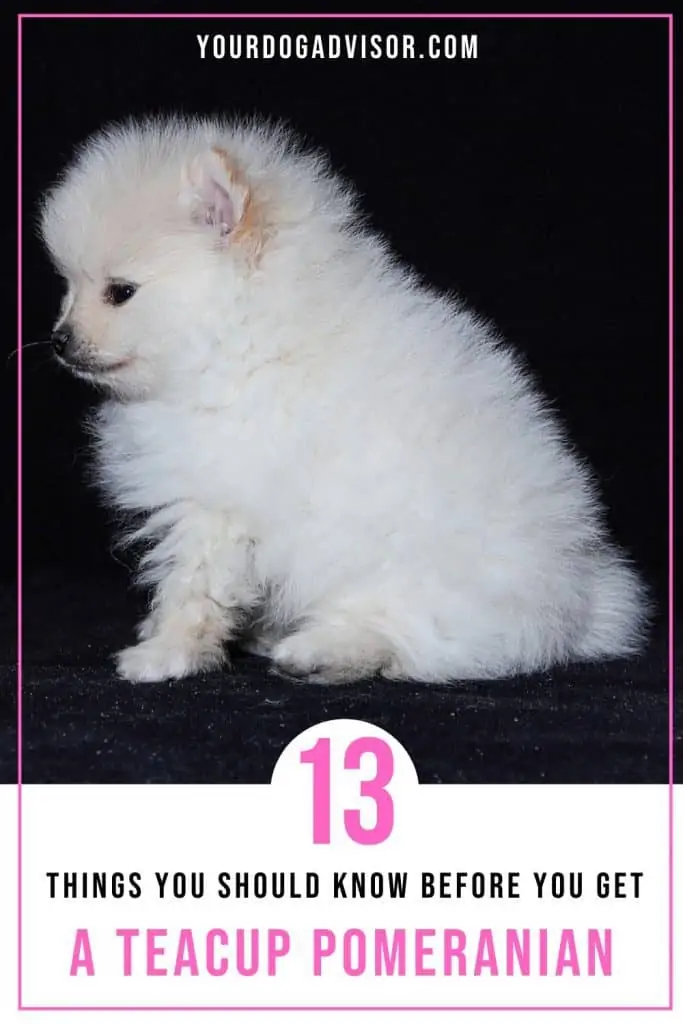

Jen Jones is a professional dog trainer and behavior specialist with more than 25 years of experience. As the founder of ‘Your Dog Advisor’ and the ‘Canine Connection’ rehabilitation center, she applies a holistic, empathetic approach, aiming to address root causes rather than merely treating symptoms.
Well known for her intuitive and compassionate approach, Jen adopts scientifically-proven, reward-based methods, encouraging positive reinforcement over punishment. Jen specializes in obedience training, behavior modification, and puppy socialization. Her innovative methods, particularly in addressing anxiety and aggression issues, have been widely recognized. Jen has worked with many of the world’s leading dog behaviorists and in her free time volunteers with local animal shelters and rescue groups.
